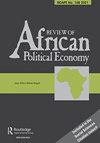Autonomous projects in the face of the global fishing market: women fish processors in Senegal in a context of climate emergency
IF 1.4
3区 社会学
Q1 AREA STUDIES
引用次数: 0
Abstract
ABSTRACT This article aims to analyse the difficult relationship between the needs of the Senegalese state to obtain economic compensation for the over-exploitation of natural resources, the right to food sovereignty of the local population, and the survival of the environment. It focuses on the fisheries agreements signed by Senegal with the European Union (EU) and how these have an impact on the conditions of people who make a living from the sector, analysing the situation and the self-organising of women involved in fish processing, an activity that sustains their autonomy and their ongoing reproduction as a collective. Declared goals of sustainable fishing in the latest protocol implementing the EU–Senegal Fisheries Agreement (2019–2024) are at odds with the actual over-exploitation of the marine environment. The commitment expressed in Article 2 of the agreement to ‘promote sustainable fishing and protect marine biodiversity’ contrasts with the lived experiences of women fish processors, expressed in denunciations of campaigns such as Greenpeace Afrique’s AnaSamaJën (where is my fish?). Based on the assumption that overfishing is a form of extractivism that undermines food sovereignty and the sustainability of local societies, this article first analyses the agreements signed between Senegal and the EU, including their clear anthropocentric ontology (Escobar 2017) and discusses how the state takes up the financial, environmental and food challenges posed by climate change. The second part, based on fieldwork and interviews with women fish processors and other actors in the sector, shows how these international agreements affect their economic and social conditions as well as their resistance, where social struggles and environmental thinking are linked.面对全球渔业市场的自主项目:气候紧急情况下的塞内加尔妇女鱼类加工者
ABSTRACT 本文旨在分析塞内加尔国家为过度开采自然资源获取经济补偿的需求、当地居民的粮食主权权利和环境生存之间的困难关系。本报告重点关注塞内加尔与欧盟(EU)签署的渔业协定,以及这些协定如何影响以渔业为生的人们的生活条件,分析了从事鱼类加工的妇女的处境和自我组织情况,这项活动维持着她们的自主权和作为一个集体的持续再生产。欧盟-塞内加尔渔业协定(2019-2024 年)最新实施议定书中宣布的可持续渔业目标与海洋环境的实际过度开发不符。该协定第 2 条所表达的 "促进可持续渔业和保护海洋生物多样性 "的承诺,与非洲绿色和平组织的 AnaSamaJën (我的鱼在哪里?)基于过度捕捞是一种破坏粮食主权和当地社会可持续性的采掘主义的假设,本文首先分析了塞内加尔与欧盟签署的协议,包括其明确的人类中心主义本体论(埃斯科瓦尔,2017 年),并讨论了国家如何应对气候变化带来的金融、环境和粮食挑战。第二部分基于实地调查和对女性鱼类加工者及该行业其他参与者的访谈,展示了这些国际协议如何影响她们的经济和社会状况以及她们的反抗,其中社会斗争和环境思考是相互关联的。
本文章由计算机程序翻译,如有差异,请以英文原文为准。
求助全文
约1分钟内获得全文
求助全文
来源期刊

Review of African Political Economy
Multiple-
CiteScore
3.00
自引率
7.70%
发文量
29
期刊介绍:
The Review of African Political Economy (ROAPE) is a refereed journal committed to encouraging high quality research and fostering excellence in the understanding of African political economy. Published quarterly by Routledge, Taylor & Francis Group for the ROAPE international collective it has since 1974 provided radical analysis of trends and issues in Africa. It has paid particular attention to the political economy of inequality, exploitation and oppression, whether driven by global forces or local ones (such as class, race, community and gender), and to materialist interpretations of change in Africa. It has sustained a critical analysis of the nature of power and the state in Africa.
 求助内容:
求助内容: 应助结果提醒方式:
应助结果提醒方式:


